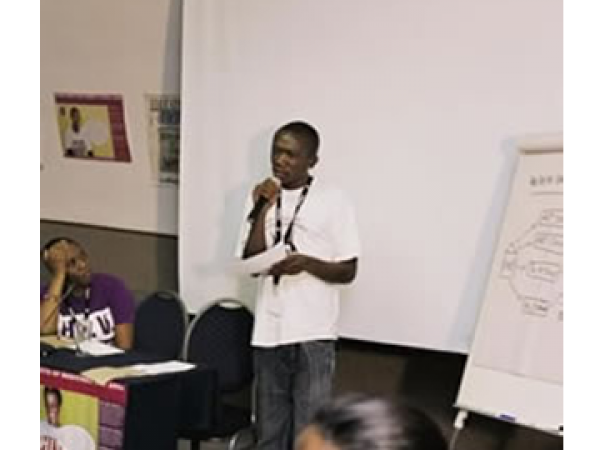

Paul Kasonkomona. Photo courtesy Tillmans/i-Base.
24 October 2013
The long-awaited criminal case against Paul Kasonkomona began on 16 and 17 October in the Lusaka Magistrates Court. Witnesses for the prosecution testified during the hearing. According to Anneke Meerkotter of the Southern African Litigation Centre (SALC), the “evidence led by the State during Kasonkomona’s trial confirms suspicions that the arrest and prosecution of Kasonkomona was politically motivated”.
Earlier this year, the Vice President of Zambia, Guy Scott was quoted in an interview with The Guardian saying the Zambian government had to “do something because if we had done absolutely nothing, we would have got a bollocking from all these evangelical churches plus damn idiots. On the other hand, we didn’t want to give him a particularly hard ride.”
Kasonkomona is represented by Sunday Nkonde of SBN Legal Practitioners. The prosecution called three witnesses. The first witness was Mabvuto Phiri who testified that he is the producer of The Assignment – the programme on which Kasonkomona called for the decriminalization of homosexuality and sex work to help stem HIV transmission.
In his testimony, Phiri said that he felt that the programme was important to air as he felt that the issue of gay rights was topical at the time considering the constitutional debates taking place in the week prior to airing.
The Assignment was screened at 19:15 on 7 April 2013 and was flighted across the African continent. According to Phiri in his testimony, it was in the public interest and in the interests of freedom of expression to create a platform for an informed debate on gay rights.
After Phiri’s testimony, parts of The Assignment were screened for the court, including the segments in which Kasonkomona appeared and argued that current initiatives to reduce HIV infection had not worked and that every intervention to stop the spread of HIV should be embraced.
The State then called on its second witness, Reverend Pukuta Mwanza who is the Director of the Evangelical Fellowship of Zambia. Mwanza confirmed that he did not see the programme when it aired, but instead read reports about it after being alerted to it by Bishop Joshua Banda, who is the Chairperson of the National Aids Council.
Mwanza testified that after reading the reports he was of the opinion that Kasonkomona’s comments were against Christian values. He further confirmed that similar discussions had taken place during the constitutional drafting process, yet no one had been arrested then.
Mwanza’s evidence was disputed by the defence as irrelevant and a personal opinion, which the magistrate confirmed cannot lead to anything substantial. Mwanza did not testify in the capacity of an expert. It was not also not clear whether Mwanza was representing the 20,000 churches who are members of the Evangelical Society of Zambia.
The State’s third witness was one of the detectives who was involved in arresting Kasonkomona. The detective testified that he has been made aware by 5pm on 7 April 2013 that The Assignment would be airing a programme on gay rights. According to the third witness, he was instructed by his superior to go to Muvi TV studios (where The Assignment is recorded) “watch a bit and then apprehend” Kasonkomona. This suggests that a decision to arrest Paul was made before he had made any comments on television according to Meerkotter. Meerkotter further added that it later became clear that he had not seen much of the programme as he misquoted Kasonkomona during cross-examination.
According to Meerkotter the State was not able to provide evidence to prove any of the elements in its case against Kasonkomona. The prosecution called for a postponement to call on a further witness. The next trial date will be 29 October 2013 at 9am in the Lusaka Magistrate’s Court.
Kasonkomona will also be launching a constitutional petition on 1 November 2013 dealing with the constitutionality of the charges against him. His legal team will raise concerns that they have been unable to obtain the prosecution’s witness statements or the evidence against Kasonkomona, which jeopardizes his right to a fair trial.